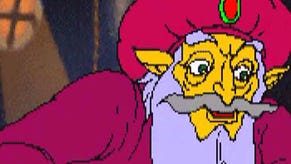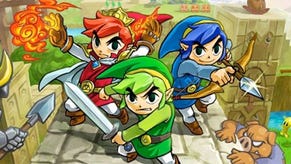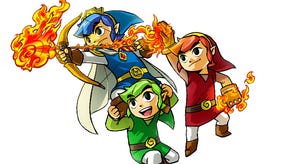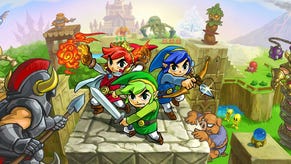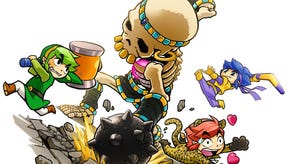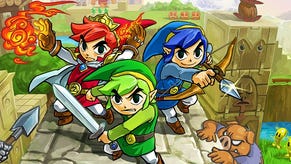The Legend of Zelda: Tri Force Heroes Review: Three's a Crowd [Update: Final Thoughts and Score!]
After ten years, Nintendo finally gives us another multiplayer Zelda. But was it worth the wait?
This article first appeared on USgamer, a partner publication of VG247. Some content, such as this article, has been migrated to VG247 for posterity after USgamer's closure - but it has not been edited or further vetted by the VG247 team.
[Editor's Note: Since Tri Force Heroes is a primarily multiplayer game, this review was originally posted as a two-page review-in-progress. If you'd like to read my final thoughts on the game, you can always skip straight to the third page.]
Lead Reviewer: Bob Mackey, Senior Writer
After The Legend of Zelda: Skyward Sword broke my heart, 2013's A Link Between Worlds let the healing begin. True, portable installments of this series typically go for a more experimental approach, but Nintendo's willingness to toss aside tradition more than ever before restored my faith in a series that seemed to be spinning its wheels for quite some time.
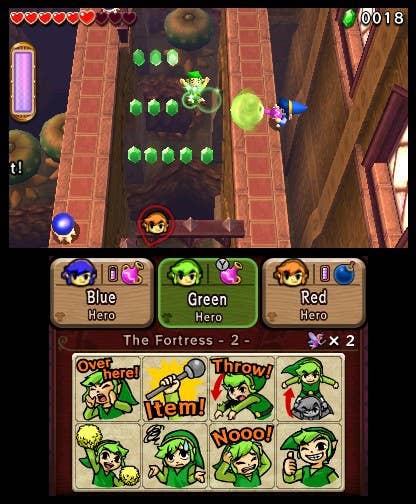
So it probably doesn't need to be said that I've been excited for Tri Force Heroes since its first reveal; as a fan of the GameCube's great Four Swords Adventures, I know from experience how well The Legend of Zelda lends itself to multiplayer fun—and I've been mystified as to why Nintendo didn't revisit this idea earlier. Tri Force Heroes is a bit different from FSA, though, and not just because it drops the number of Links from four to three. While Four Swords Adventures felt more like a brawler with some switch-stepping and torch-lighting thrown in for good measure, Tri Force Heroes takes the form of a more puzzle-heavy experience, where enemies mostly exist as things to slash between figuring out how to successfully move your Links from Point A to Point B. A worthwhile idea in theory, but in practice, Tri Force Heroes feels like the prototype for what could have been a much better game.
On the bright side, this may be the most irreverent take on Zelda yet, one that often feels like it's playfully thumbing its nose at people with any investment in the series' timeline. In the land of Hytopia, it only takes a certain kind of look to be regarded as The Chosen One, and some of the funnier moments of TFH involve a pink-haired Link to the Past Link bemoaning the fact it isn't him who's been asked to save the Kingdom. The Legend of Zelda has never been too self-serious, but, at times, Tri Force Heroes feels like an outright comedy, right down to the numerous goofy costumes you can have link don, from full-body Zora suits to Zelda dresses to cheerleader outfits. It's a shame that, with the presence of Wind Waker Link (at least in terms of design), TFH doesn't apply the same art style to the rest of the game—or even a visually consistent one, at that—but it's still since to see so much thought put into making the player smile.
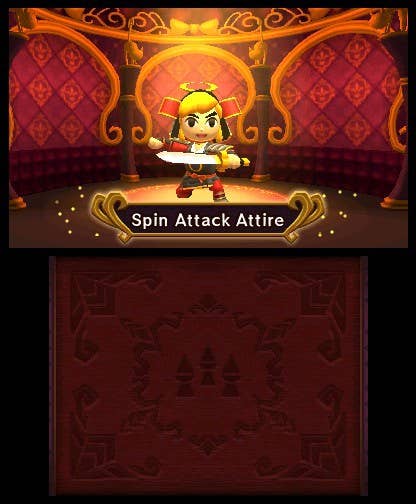
Tri Force Heroes differs from your typical Legend of Zelda in that there's no real overworld or formal dungeons; instead, you're given a list of levels to choose from, which each one tasking your team of Links to make it to the Triforce symbol that lies beyond an assortment of environmental puzzles. Each one of these 32 areas offers a specific set of Legend of Zelda tools, though one Link will usually be forced to pick up a different one just to make things interesting. And this could be the first Zelda game to focus primarily on loot, because once you finish an area, you're not necessarily done with it: TFH encourages diving into levels over and over again in the hopes that the one random reward at the end will be just the thing you need to craft the next ridiculous costume you've been eyeing. It's a smart choice, and one that will likely keep TFH's online community active long after most players have reached the end.
In theory, the fundamental outline of Tri Force Heroes stands as an excellent idea, but, in practice, it can often be a nightmare. This may sound like hyperbole, but if you have any notions of even touching the single-player aspect TFH, remove them from your mind immediately. Nintendo came up with the most perfunctory attempt to transform the multiplayer action into something manageable by a single human being, which ranges from tedious at best to horrifyingly demanding at worst. If you go with single-player mode, you're essentially doing the work of three different people by switching between different Links on the fly using the touchpad—the two you aren't controlling revert to lifeless husks. The biggest problem, though, is that TFH apparently doesn't make any alterations if you're playing alone, which can lead to some maddening moments when you reach puzzles that require simultaneous action from two Links at once. At times, I had no choice but to simply exit a level after my nth attempt at a puzzle that was ostensibly possible to finish, but required split-second timing more appropriate for a team of two brains and four hands.
My limited time with TFH's multiplayer mode amounted to local, download play—see Jeremy's Second Opinion on the next page for an account of his online experience—and could have been just fine if not for the lag and constant pauses as the game desperately tried to keep all of our 3DSes in sync. Our session took place in the same room with all three participants sitting roughly five feet from each other, yet this experience soon devolved into us throwing back our heads and laughing at just how frequently Tri Force Heroes threw the brakes on what could have been a fun time. Now, I've spoken with other reviewers who claimed to have none of these problems, and the fact that Nintendo could easily patch them out on the first day makes me a little wary of giving a low score to a version of Tri Force Heroes that essentially doesn't exist. So, until I'm able to play more in the post-release period, check out Jeremy's thoughts on the game.
InterfaceLink controls as he should, but your array of limited communication options are, frankly, too limited.
Lasting AppealTri Force Heroes is built on playing and replaying the same levels over and over, but in its current state, that doesn't stand as the most appealing proposition.
SoundProbably the best part of Tri Force Heroes, chock-full of silly, melodramatic vocal flourishes.
VisualsFunctional, for the most part. Tri Force Heroes puts you in control of a Wind Waker-style Link, yet the world and characters around him don't fit with this visual theme—or any, for that matter.
ConclusionNintendo had a fantastic idea with Tri Force Heroes, but the premise is underserved and undermined by some fundamental design issues and shaky online infrastructure. It's nothing short of a tragedy to wait a whole decade for another multiplayer Zelda and receive what feels like a largely unfinished idea with great potential.
Second Opinion: Jeremy Parish, Editor-in-Chief
Well, I suppose the streak had to end eventually, but I'm sad to see it peter out after more than 20 years: Nintendo's finally made a Zelda spinoff I don't love. Tri Force Heroes is the first Nintendo-developed side story to the franchise I actively don't want to play. This, from someone who enjoyed Link's Awakening more than A Link to the Past and who sincerely loves Phantom Hourglass and Spirit Tracks.
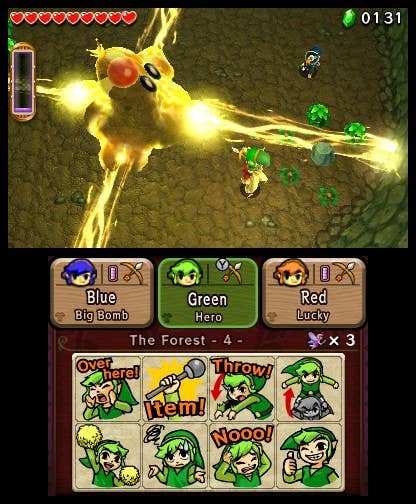
Unfortunately, Tri Force Heroes doesn't make the grade. I don't hate it, and I can sense some brilliant machinery attempting to wheeze its way to life, somewhere beneath the game's unsatisfying surface. The problem, really, is that Tri Force Heroes leaves me with the unmistakable impression that Nintendo didn't quite finish constructing the machine in question. Every aspect of Tri Force Heroes feels frustratingly incompletely, from the tedious single-player mode to the unbearably lag-prone multiplayer.
The latter issue annoys me most. I've played about half a dozen multiplayer sessions now, and every single one of them suffered from connectivity slowdown that rendered the game—literally—almost completely unplayable. When Tri Force Heroes suffers communication problems, every player's game slows down or pauses simultaneously to prevent the action from desyncing. It's not a bad idea, but in my experience Tri Force Heroes' multiplayer constantly suffers from communication problems. Whether playing online or locally, my sessions quickly became bogged down by pauses and slow-down, occasionally culminating in disconnection errors.
My inability to play Tri Force Heroes with others particularly frustrates given that Tri Force Heroes essentially demands to be approached via multiplayer sessions. It has a single-player component, yes, but that mode is literally the multiplayer version in which a single person has to juggle three different characters. In a sense, the single-player version is slightly easier than multiplayer: You can only control a single Link at a time, and the inactive heroes become inert dolls, immune to damage. In cooperative sessions, all three players remain active at all times, sharing a single life bar, and a single clumsy action can wipe a huge chunk of health away from the team in an instant. But this one boon doesn't make up for the fact that the single-player mode is cumbersome at the best of times, and completely frustrating at others.
Tri Force Heroes doesn't appear to tweak its mechanics to account for the fact that a single player has to swap rapidly between multiple Links in order to solve many of the game's puzzles; tasks that can easily be completed by two or three players working in unison become exercises in split-second perfection, repetition, and trial-and-error (all at once).
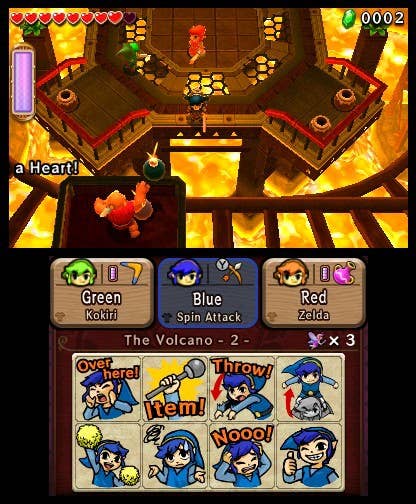
As a result of its multiplayer focus, the game also lacks a compelling progression hook. Link doesn't become stronger the longer you play; instead, you unlock new costumes that grant you specific (and usually singular) skill boosts. There are a few problems with this system, though. For one, your suits generally enhance a specific sub-weapon, yet you commit to a suit before picking a level and seeing which subweapons will be available in that stage. It's a trivial issue, but an annoying oversight of design. To create suits, you need to collect materials. Those materials are doled out as rewards, semi-randomly, at the end of each stage. The game encourages you to replay stages over and over again, not just with the loot drops but also by making certain materials available only by playing one of each level's four variants. It honestly feels like Nintendo took cues from Destiny while designing Tri Force Heroes, but they were all the wrong cues.
I find Tri Force Heroes' issues particularly vexing because the game almost works. It attempts to harness the concept of Four Sword Adventures while reshaping it into something less like pure action and more faithful to the Zelda series' puzzle-centric design. When it works, the game is an absolutely blast to play; teaming up with some friends at other sites via online play left had me cracking up the entire time (or at least the entire time our connection held up, anyway). Trying to coordinate three people together to solve combat puzzles entirely with the use of a palette of emote macros should be frustrating, but on the contrary, it's actually completely hilarious.
I just wish those moments of amusement didn't ultimately comprise so little of the time I spent with the game. Tri Force Heroes was, for me, a lot of waiting, a lot of annoyance, and a lot of grinding tedium. The idea behind the game is strong, and when it all comes together you can see flashes of greatness... but ultimately it feels like a product that was hustled out the door before it was properly completed. Between the underbaked singleplayer mode and the connection issues that dogged every multiplayer session I attempted, this feels like the alpha version of an amazing Zelda spinoff. But as it is, I find myself hard-pressed to muster up the enthusiasm to spend anymore time with it.
Check back on Monday to see our final thoughts and a proper score for Tri Force Heroes!
InterfaceLink controls as he should, but your array of limited communication options are, frankly, too limited.
Lasting AppealTri Force Heroes is built on playing and replaying the same levels over and over, but in its current state, that doesn't stand as the most appealing proposition.
SoundProbably the best part of Tri Force Heroes, chock-full of silly, melodramatic vocal flourishes.
VisualsFunctional, for the most part. Tri Force Heroes puts you in control of a Wind Waker-style Link, yet the world and characters around him don't fit with this visual theme—or any, for that matter.
ConclusionNintendo had a fantastic idea with Tri Force Heroes, but the premise is underserved and undermined by some fundamental design issues and shaky online infrastructure. It's nothing short of a tragedy to wait a whole decade for another multiplayer Zelda and receive what feels like a largely unfinished idea with great potential.
Lead Reviewer: Bob Mackey, Senior Writer
With my initial attempt to evaluate Tri Force Heroes, I chose to withhold my final review score until a later date, if only to give Nintendo the benefit of the doubt. With any luck, the issues with lag in both local and online multiplayer would be patched out soon after release, making my rough ride with TFH an experience the majority of users simply wouldn't have.
It's too bad this ideal scenario never came to pass.
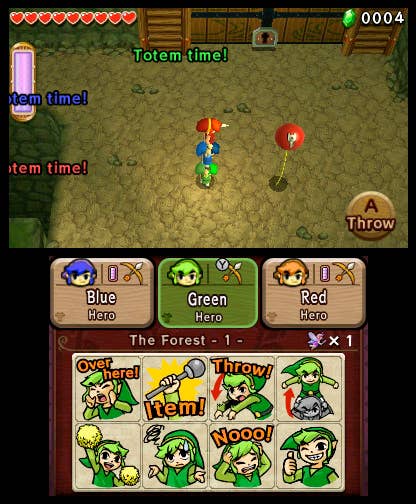
As I said earlier in this review, I'm aware others aren't necessarily having the same technical issues as me. When I complained about my ongoing problems with Tri Force Heroes last weekend via Twitter, some helpful people took it upon themselves to troubleshoot what could have very well been an issue with my modem or router. Everything checked out on that end, so I dropped into a quick online game of Monster Hunter 4 Ultimate and saw none of the catastrophic frame drops and annoying pauses that kill any possibility of fun in Tri Force Heroes. So, let me assure you: Everything should work as intended. I guess I just happen to keep pulling the short straw when it comes to being paired alongside other people with lousy connections.
That's not to say every minute of online play has been unbearable; at its best, what Tri Force Heroes wants to be shines through sessions I'd charitably call "less laggy." Even so, TFH seems designed with an ideal online environment in mind, as many of its challenges have a margin of error too small to account for potential lag. And while I'm willing to throw myself into a puzzle over and over again until I get things right, "failure" in this case often entails losing hearts, and because your entire team shares a single health meter, it's entirely too easy to find yourself going from full health to an untimely death.
One particularly annoying challenge forced us to totem our Links to shoot lofty switches while avoiding fiery boulders raining in from the heavens. Getting hit with one of these meant all three of us suffered combined damage, so it only took a few mistakes before we found ourselves back at the beginning again—another huge problem with Tri Force Heroes. After getting your butt handed to you by a particular puzzle or encounter, there's nothing more demoralizing than having to go through the tedium of repeating those earlier steps all over again.
When Tri Force Heroes director Hiromasa Shikata told me in a recent interview the game's emote-based communication system was meant to be a challenge in and of itself, I had a greater appreciation for a mechanic that initially felt like a perfunctory solution to communication. And while I understand his intent, the few communication options available don't serve Shikata's goals very well; the entire bottom row of the emote grid, for instance, is completely occupied by two variations of both "happy" and "sad." If Tri Force Heroes eliminated these superfluous emotes, it would make room for two additional ones that could potentially hold a lot more meaning. Many times, this Legend of Zelda interpretation of charades utterly failed me, no matter how much I struggled to use my limited vocabulary to instruct my teammates. I don't think Tri Force Heroes needs voice or text chat, mind you; I'm the type who prefers not talking to strangers on the Internet if I can help it. But what's provided here isn't nearly useful enough to work effectively.
Tri Force Heroes also throws up strange restrictions for multiplayer sessions, which honestly killed my hopes for playing locally. I planned on going through the game alongside my girlfriend via Download Play, but you simply can't team up with only one other person—strange, since the levels are potentially beatable in single-player. TFH also didn't bother thinking up a safety net if one player drops out; instead of pausing the session and waiting for another player to fill the space—as would happen in any other reasonable online game—you're booted from the current level and your progress is completely wiped. If something like that happened, say, at the end of a Final Fantasy XIV dungeon, I'd probably hurl my PS4 across the living room like some kind of potentially fatal discus.
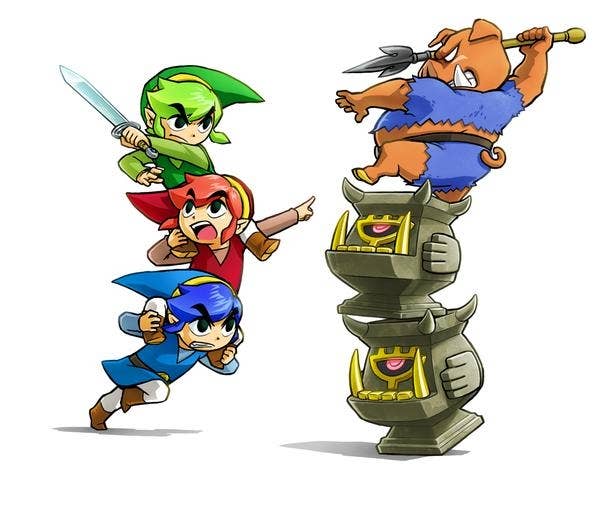
Just a few weeks ago, Tri Force Heroes stood as one of my most anticipated games of the fall; as of this writing, it's hard for me to think of anything else released this year that's made me angrier. And the most frustrating thing is, as Jeremy said, the parts of a great game exist within Tri Force Heroes, but they're way too undercooked to deliver on the premise's potential.
It's especially disappointing because, after Splatoon, it seemed as if Nintendo was on the right track in regards to online play; Tri Force Heroes takes some major steps back to the point where it feels like some of their developers were intentionally withholding information from one another. But it's more likely a case of Nintendo not fully thinking out the logistics of online play and the potential problems of their intentional restrictions. With any luck, it won't take another ten years for us to see another take on this honestly great idea once again.
InterfaceLink controls as he should, but your array of limited communication options are, frankly, too limited.
Lasting AppealTri Force Heroes is built on playing and replaying the same levels over and over, but in its current state, that doesn't stand as the most appealing proposition.
SoundProbably the best part of Tri Force Heroes, chock-full of silly, melodramatic vocal flourishes.
VisualsFunctional, for the most part. Tri Force Heroes puts you in control of a Wind Waker-style Link, yet the world and characters around him don't fit with this visual theme—or any, for that matter.
ConclusionNintendo had a fantastic idea with Tri Force Heroes, but the premise is underserved and undermined by some fundamental design issues and shaky online infrastructure. It's nothing short of a tragedy to wait a whole decade for another multiplayer Zelda and receive what feels like a largely unfinished idea with great potential.

